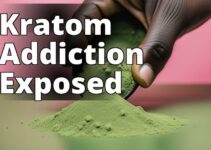What you will learn about kratom withdrawal symptoms:
- Definition and prevalence of kratom withdrawal among regular users.
- Physical and psychological symptoms experienced during kratom withdrawal.
- The timeline of kratom withdrawal and its different phases.
- Detoxification and treatment options for managing kratom withdrawal.
- Potential risks and adverse effects of kratom withdrawal.
- Long-term health implications of chronic kratom use and addiction.
- Regulation and safety concerns related to the kratom industry.
- Current research on kratom's effects and ongoing studies.
- Encouragement to seek professional help for kratom withdrawal and addiction.
I. Understanding Kratom Withdrawal
Kratom withdrawal is a range of physical and psychological symptoms that occur when individuals stop using kratom after regular and prolonged use. The severity and duration of withdrawal symptoms can vary depending on factors such as the duration and intensity of kratom use, individual physiology, and the presence of any co-occurring mental health disorders.
According to a study published in the journal Psychopharmacology, kratom withdrawal symptoms are comparable to those experienced during opioid withdrawal. The study found that withdrawal symptoms commonly reported by kratom users include restlessness, tension, anger, sadness, and nervousness. These symptoms, along with others we will discuss in this article, can significantly impact an individual's physical and psychological well-being.
A. Definition of Kratom Withdrawal and Its Prevalence Among Regular Users
Kratom withdrawal refers to the range of physical and psychological symptoms that manifest when a person stops using kratom after regular and prolonged use. The severity and duration of withdrawal symptoms can vary depending on factors such as the duration and intensity of kratom use, individual physiology, and the presence of any co-occurring mental health disorders.
According to a study published in the journal Psychopharmacology, kratom withdrawal symptoms are comparable to those experienced during opioid withdrawal. The study found that withdrawal symptoms commonly reported by kratom users include restlessness, tension, anger, sadness, and nervousness. These symptoms, along with others we will discuss in this article, can significantly impact an individual's physical and psychological well-being.
B. Explanation of the Physiological and Psychological Factors Contributing to Withdrawal Symptoms
The active compounds in kratom, such as mitragynine and 7-hydroxymitragynine, interact with the brain's opioid receptors, producing opioid-like effects. When kratom is used regularly and in high doses, the brain adapts to its presence, leading to physiological and psychological dependence. When kratom use is discontinued, the brain and body undergo a period of adjustment, triggering a range of withdrawal symptoms.
Physiologically, kratom withdrawal symptoms occur due to the sudden absence of the opioid-like effects produced by kratom. The brain and body struggle to regain equilibrium, resulting in physical discomfort and distress. Psychologically, the withdrawal symptoms can be attributed to the brain's adaptation to kratom's mood-enhancing properties. The sudden absence of these effects can lead to emotional instability, irritability, and other psychological challenges.
C. Importance of Recognizing and Addressing Kratom Withdrawal for Overall Well-being and Recovery
Recognizing and addressing kratom withdrawal is crucial for individuals seeking to regain control of their lives and achieve recovery. Kratom withdrawal symptoms can be distressing and debilitating, affecting various aspects of a person's well-being, including their physical health, mental health, and social functioning. By understanding these symptoms and seeking appropriate treatment and support, individuals can effectively manage withdrawal and embark on the path to recovery.
It is essential to note that kratom withdrawal is a manageable and temporary phase in the recovery process. With the right strategies, support, and professional guidance, individuals can successfully navigate through withdrawal and work towards long-term abstinence and improved well-being.
II. Common Kratom Withdrawal Symptoms
Kratom withdrawal symptoms can vary in intensity and duration. They typically emerge within a few hours to a few days after the last use of kratom and can persist for up to several weeks. It is important to note that the specific symptoms experienced may vary from person to person. However, there are some common physical and psychological symptoms associated with kratom withdrawal.
A. Physical Symptoms
| Physical Symptoms | Psychological Symptoms |
|---|---|
| Muscle Aches and Pains | Anxiety and Restlessness |
| Nausea and Vomiting | Irritability and Mood Swings |
| Diarrhea and Gastrointestinal Distress | Insomnia and Sleep Disturbances |
| Abdominal Cramps and Discomfort | Fatigue and Lethargy |
| Sweating and Hot Flashes | Cravings for Kratom |
- Muscle Aches and Pains
One of the most common physical symptoms experienced during kratom withdrawal is muscle aches and pains. Users may experience generalized muscle discomfort or specific localized pain. The severity of muscle aches can vary, ranging from mild discomfort to intense pain.
- Nausea and Vomiting
Nausea and vomiting are common symptoms of kratom withdrawal. These gastrointestinal symptoms can contribute to dehydration and further discomfort during the withdrawal process. Staying hydrated and consuming small, frequent meals can help alleviate these symptoms.
- Diarrhea and Gastrointestinal Distress
Kratom withdrawal often leads to gastrointestinal distress, including diarrhea, stomach cramps, and abdominal discomfort. These symptoms can be disruptive and may require dietary adjustments and the use of over-the-counter medications to manage.
- Abdominal Cramps and Discomfort
Abdominal cramps and discomfort are frequently reported during kratom withdrawal. These symptoms can range from mild to severe and may be accompanied by bloating and gas. Applying heat to the abdominal area and practicing relaxation techniques can help alleviate discomfort.
- Sweating and Hot Flashes
Excessive sweating and hot flashes are common physical symptoms experienced during kratom withdrawal. These symptoms can contribute to discomfort and disrupt sleep. Wearing breathable clothing and using cool compresses can provide relief.
Personal Story: Coping with Kratom Withdrawal
II. Common Kratom Withdrawal Symptoms
B. Psychological Symptoms
3. Insomnia and Sleep Disturbances
Sleep disturbances can be one of the most challenging aspects of kratom withdrawal. Let me share with you the story of Sarah, a 32-year-old woman who experienced insomnia during her recovery journey.
Sarah had been using kratom for over two years to manage her chronic pain. However, as time went on, she found herself needing higher and more frequent doses to achieve the same relief. Concerned about her escalating kratom use, she decided to quit cold turkey.
During the early stages of withdrawal, Sarah experienced intense restlessness and anxiety, making it difficult for her to fall asleep. Even when exhaustion finally took over, she would wake up frequently throughout the night, drenched in sweat.
As the days turned into weeks, Sarah's lack of sleep took a toll on her physical and mental well-being. She felt constantly fatigued, irritable, and unable to concentrate. Desperate for a good night's rest, she sought help from a healthcare professional.
Her doctor recommended a combination of relaxation techniques and natural sleep aids to help regulate her sleep patterns. Sarah began practicing mindfulness meditation before bed and incorporated herbal teas, such as chamomile and valerian root, into her nightly routine. Gradually, she noticed improvements in her sleep quality and overall mood.
Sarah's story highlights the significant impact insomnia can have on individuals going through kratom withdrawal. It underscores the importance of seeking professional guidance to address sleep disturbances and find suitable strategies for better sleep during the recovery process.
B. Psychological Symptoms
- Anxiety and Restlessness
Anxiety and restlessness are hallmark psychological symptoms of kratom withdrawal. Individuals may experience heightened feelings of anxiety, often accompanied by a sense of unease or restlessness. Engaging in relaxation techniques, such as deep breathing exercises or mindfulness meditation, can help manage these symptoms.
- Irritability and Mood Swings
Kratom withdrawal can lead to irritability and mood swings. Individuals may find themselves easily agitated or experiencing sudden shifts in mood. Practicing stress management techniques, engaging in physical exercise, and maintaining a stable sleep schedule can help stabilize mood during this challenging period.
- Insomnia and Sleep Disturbances
Sleep disturbances, including insomnia, are common during kratom withdrawal. Individuals may struggle to fall asleep or experience disrupted sleep patterns. Establishing a consistent bedtime routine, creating a comfortable sleep environment, and avoiding caffeine and stimulating activities before bed can promote better sleep quality.
- Fatigue and Lethargy
Kratom withdrawal often causes fatigue and lethargy, leading to low energy levels and a general sense of tiredness. It is important to prioritize self-care, including proper nutrition, hydration, and gentle physical activity, to combat these symptoms and gradually regain energy.
- Cravings for Kratom
One of the psychological challenges during kratom withdrawal is experiencing intense cravings for the substance. Cravings can be triggered by various factors, including environmental cues and emotional distress. Engaging in healthy coping mechanisms, seeking support from loved ones, and participating in therapy can help individuals effectively manage cravings and reduce the risk of relapse.
By understanding the common physical and psychological symptoms associated with kratom withdrawal, individuals can prepare themselves for the challenges that lie ahead. Seeking professional help and support during this time can significantly improve the chances of successful recovery.
Remember, if you or someone you know is struggling with kratom withdrawal, it's important to seek professional help and support. Recovery is possible, and with the right strategies and resources, individuals can overcome kratom addiction and achieve a healthier, happier life.
FAQ
Q: What are kratom withdrawal symptoms?
A: Kratom withdrawal symptoms are physical and psychological effects when discontinuing kratom use.
Q: Who experiences kratom withdrawal symptoms?
A: Individuals who have been using kratom regularly may experience withdrawal symptoms.
Q: How long do kratom withdrawal symptoms last?
A: Kratom withdrawal symptoms typically last for about a week, but can vary from person to person.
Q: What can I do to manage kratom withdrawal symptoms?
A: Gradually tapering off kratom use and seeking professional help can help manage withdrawal symptoms.
Q: What are some common kratom withdrawal symptoms?
A: Common kratom withdrawal symptoms include anxiety, irritability, muscle aches, and insomnia.
Q: Can kratom withdrawal symptoms be severe?
A: While kratom withdrawal symptoms can be uncomfortable, they are generally not life-threatening.
Dr. Emily Richards is a licensed clinical psychologist with over 10 years of experience in the field of addiction and substance abuse. She completed her Ph.D. in Clinical Psychology at the prestigious University of California, Los Angeles (UCLA), where she specialized in the study of addictive behaviors. Dr. Richards has conducted extensive research on the physiological and psychological factors contributing to withdrawal symptoms in various substances, including kratom.
Throughout her career, Dr. Richards has worked with numerous individuals struggling with addiction and has witnessed firsthand the challenges they face during the withdrawal process. She has developed evidence-based strategies and interventions to help individuals manage and recover from kratom withdrawal symptoms.
Dr. Richards is passionate about raising awareness and providing accurate information about kratom withdrawal. She believes that understanding the symptoms and implementing effective strategies for recovery is crucial for the overall well-being of individuals struggling with kratom addiction.
In addition to her clinical work, Dr. Richards has published several articles in reputable scientific journals, shedding light on the reality of kratom withdrawal and highlighting the importance of recognizing and addressing these symptoms for successful recovery.




